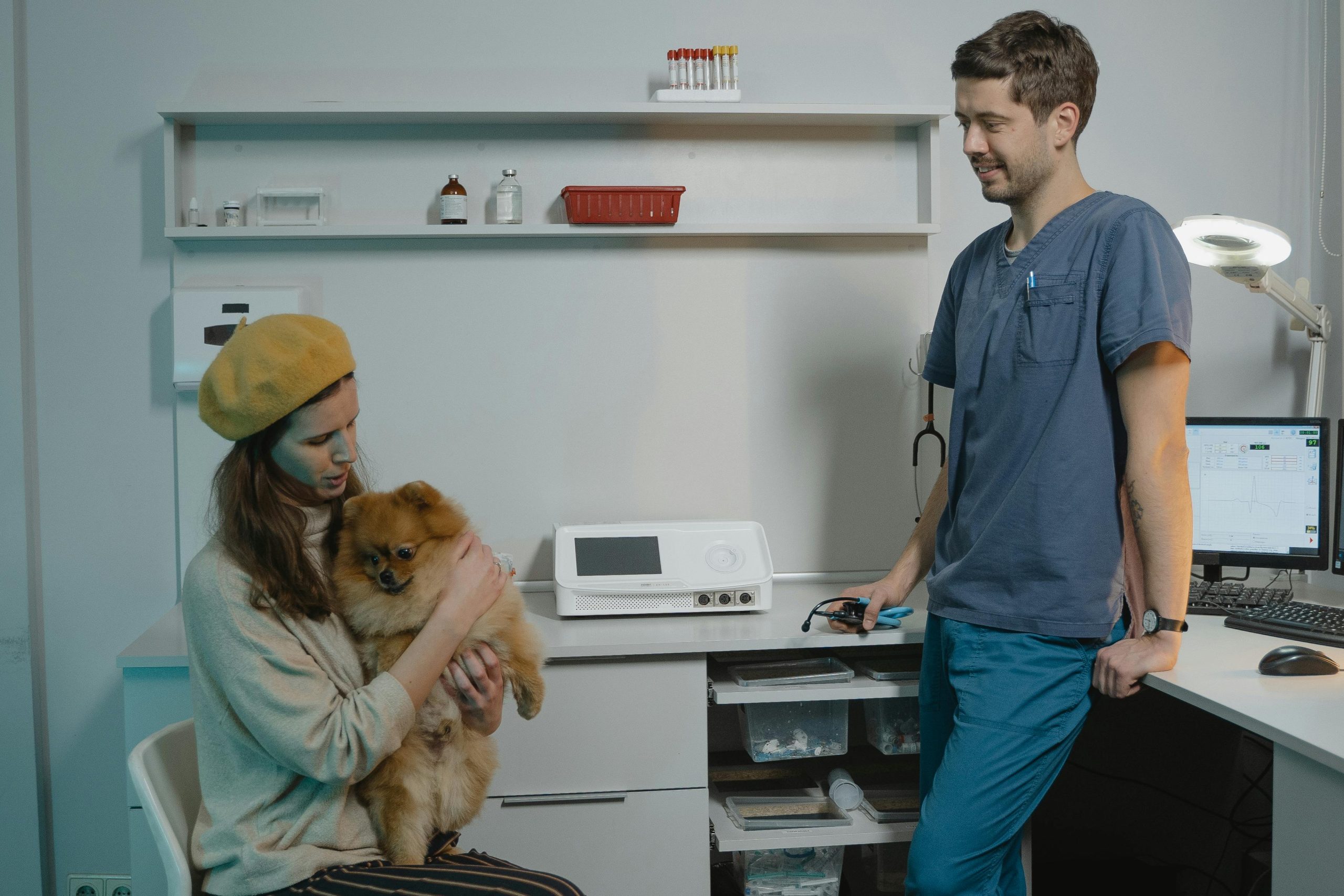As pet parents, we want nothing more than to see our beloved companions thrive through every stage of life. Just like humans benefit from regular check-ups, our pets need consistent veterinary care to ensure they remain healthy and happy for years to come. Annual pet wellness exams are a cornerstone of responsible pet ownership, providing vital preventative care that can detect issues before they become serious problems.
For Westchase pet owners, understanding the importance of these regular check-ups is essential to giving your furry family members the care they deserve.
What Is a Pet Wellness Exam?
A pet wellness exam is a comprehensive preventative care visit focused on maintaining your pet’s health rather than treating existing illness. These annual (or bi-annual for senior pets) appointments allow your veterinarian to establish a health baseline for your pet and monitor any changes over time.
During a typical pet wellness exam in Westchase, your veterinarian will:
- Conduct a nose-to-tail physical examination
- Check vital signs, including weight, temperature, and heart rate
- Assess dental health
- Evaluate skin and coat condition
- Perform age-appropriate laboratory tests
- Update necessary vaccinations
- Discuss nutrition and exercise needs
- Address any behavioral concerns
These examinations serve as your pet’s primary defense against potential health threats and provide an opportunity for early intervention when needed.
Why Regular Wellness Exams Are Non-Negotiable
Early Detection Saves Lives
One of the most compelling reasons to schedule regular pet wellness exams is the power of early detection. Our animal companions instinctively hide signs of illness, a survival mechanism from their wild ancestors that unfortunately works against them in domesticated life. When symptoms become obvious to pet parents, conditions may have progressed significantly.
During wellness exams, Westchase veterinarians can detect subtle changes that might indicate developing issues. From slight weight fluctuations to minor irregularities in heart sounds, or to subtle signs of pain, these small details can reveal important information about your pet’s health before problems become advanced. Catching certain diseases like heart disease, kidney disease, or diabetes early may extend a pet’s life by several years.
Preventive Care Is Cost-Effective Care
While some pet parents might hesitate at the cost of annual wellness visits, preventative care is invariably more affordable than treating advanced disease. Consider that treating heartworm disease can cost 10 – 15 times more than a year’s worth of preventative medication, which would be prescribed and monitored during regular wellness appointments. Similarly, a hospitalization event could cost thousands of dollars to treat a pneumonia that may have been prevented with a simple vaccination administered during an annual visit.
By investing in routine pet wellness exams, Westchase pet owners often save significantly on long-term veterinary costs while sparing their pets unnecessary suffering.
Tailored Health Plans for Every Life Stage
Your pet’s health needs evolve dramatically throughout their lifetime. Puppies and kittens require different care from adult pets, and senior pets have their own unique health considerations. Regular wellness exams allow your veterinarian to adjust your pet’s health plan according to their changing needs.
For example, a young pet might need guidance on behavioral training and vaccination schedules, while a senior pet might benefit from more frequent bloodwork to monitor organ function or thorough orthopedic exams to detect signs of arthritis. These personalized approaches ensure your companion receives the most appropriate care at every age.
Strengthening the Veterinary-Client Relationship
Consistent wellness visits help build a relationship of trust between you, your pet, and your West Park veterinary team. This familiarity becomes invaluable during health emergencies when your pet needs urgent care. Your veterinarian will have a comprehensive understanding of your pet’s medical history, allowing for more informed treatment decisions.
Additionally, pets who regularly visit the veterinarian for positive experiences often develop less anxiety around veterinary care, making future visits less stressful for everyone involved.
What to Expect During Your West Park Pet Wellness Exam
Before the Appointment
To maximize the benefits of your pet’s wellness exam, consider:
- Writing down any questions or concerns about your pet’s health or behavior
- Bringing a fresh stool sample if requested (especially important for parasite screening)
- Bring any medications your pet is currently taking
- Gathering records of any vaccines or treatments administered elsewhere
- Bring favorite treats or toys to help your pet relax while visiting the vet
During the Examination
A thorough pet wellness exam at West Park typically takes 30 – 45 minutes. Your veterinarian will:
- Observe your pet’s overall appearance, posture, and movement
- Check vital statistics and compare them to previous visits
- Examine eyes, ears, mouth, teeth, gums, and throat for abnormalities
- Listen to heart and lung sounds
- Palpate the abdomen to assess internal organ size and shape
- Evaluate joint mobility and muscle condition
- Assess skin and coat health, checking for parasites or unusual growths. I just want to make sure the parasites link here is not going to the intestinal parasite blog, but to our derm page on parasites.
- Palpate internal structures like lymph nodes, the trachea, salivary glands, mammary glands, etc, that may indicate underlying disease.
Your veterinarian will discuss their findings with you, addressing any concerns and answering questions throughout the examination.
After the Visit
Following your pet’s wellness exam, you may receive:
- Vaccination certificates
- Preventative medication prescriptions
- Nutritional recommendations
- Follow-up appointment schedules
- Referrals to specialists, if necessary
How Often Should Pets Have Wellness Exams?
The general recommendation for healthy adult pets is one wellness exam annually. However, pets at different life stages may require more frequent care:
- Puppies and kittens: Every 3 – 4 weeks until 16 weeks old for vaccination series, then at 6 months
- Adult pets (1 -7 years for most dogs, 1 – 7 years for most cats): Annually
- Senior pets (varies by breed and species): Semi-annually
- Pets with chronic conditions: As recommended by your veterinarian
Your veterinarian in Westchase can help determine the optimal examination schedule for your specific pet based on their breed, age, lifestyle, and health status.
Frequently Asked Questions About Pet Wellness Exams
Q: Aren’t wellness exams unnecessary if my pet seems healthy?
A: Even pets that appear perfectly healthy can have underlying conditions developing silently. This is especially true for cats, but it also happens in many dogs. Many diseases show no obvious symptoms until they’re advanced. Regular pet wellness exams allow veterinarians to detect subtle changes that might indicate emerging health issues before they become serious or life-threatening.
Q: What’s the difference between a wellness exam and a sick visit?
A: A wellness exam is preventative care focused on maintaining health and preventing disease, while a sick visit addresses specific symptoms or known health issues. Wellness exams are more comprehensive and evaluation-focused, whereas sick visits target diagnosis and treatment of particular problems.
Q: How should I prepare my pet for a wellness exam in Westchase?
A: Keep your pet’s routine as normal as possible on exam day. For dogs, a short walk before the appointment can help reduce anxiety. For cats, leaving the carrier out several days before the visit can reduce stress. Bringing a favorite toy or treat can also make the experience more positive.
Q: Are vaccines always given during wellness exams?
A: Vaccines are often administered during wellness visits, but the specific vaccines your pet receives depend on their age, lifestyle, and risk factors. Your West Park veterinarian will discuss which vaccines are appropriate for your pet and may create a customized vaccination schedule.
Q: How do wellness exams change as my pet ages?
A: As pets enter their senior years, wellness exams typically become more detailed and may include additional diagnostic testing. Your veterinarian may recommend more comprehensive bloodwork, urinalysis, blood pressure monitoring, and other screenings to detect age-related conditions early.
Q: Are wellness exams worth the cost for indoor pets?
A: Absolutely! Indoor pets are still susceptible to many health conditions, including dental disease, obesity, diabetes, kidney disease, heart disease, and cancer. Indoor environments also present their own health challenges, such as limited exercise opportunities and exposure to household toxins.
Conclusion: Investing in Your Pet’s Future
Annual pet wellness exams represent one of the most significant investments you can make in your furry family member’s long-term health and happiness. For Westchase pet parents, these regular check-ups provide peace of mind knowing you’re doing everything possible to ensure your companion enjoys a vibrant, comfortable life at your side.
By prioritizing preventative care through consistent wellness visits, you’re not just addressing immediate health concerns—you’re actively extending and improving your pet’s quality of life. The bond we share with our pets deserves this level of commitment to their well-being.
Remember that your Westchase veterinary team is your partner in pet care, dedicated to supporting both you and your companion through every life stage. Schedule your pet’s next wellness exam today and take a proactive step toward many more healthy years together.







Leave A Comment